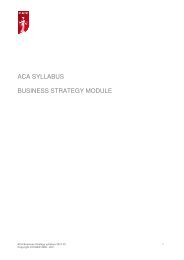6. THE RELEVANT PUBLIC’S WANTS6.1 Public op<strong>in</strong>ionIn our view, <strong>the</strong> start<strong>in</strong>g po<strong>in</strong>t <strong>in</strong> any <strong>public</strong> <strong>in</strong>terest consideration is what <strong>the</strong> relevant <strong>public</strong>wants. Popular op<strong>in</strong>ion must be relevant <strong>in</strong> consider<strong>in</strong>g what is required <strong>in</strong> <strong>the</strong> <strong>public</strong> <strong>in</strong>terest.We argue that <strong>the</strong> <strong>public</strong> <strong>in</strong>terest is not an absolute value, but a variable that depends, amongo<strong>the</strong>r th<strong>in</strong>gs, on po<strong>in</strong>ts of view. Different people arrive at decisions apply<strong>in</strong>g different sets ofvalues and perspectives and <strong>the</strong>re will not be a uni<strong>for</strong>m view. The ‘weight of <strong>public</strong> op<strong>in</strong>ion’is ano<strong>the</strong>r way of say<strong>in</strong>g ‘<strong>the</strong> majority view’ and, particularly <strong>in</strong> a democracy, <strong>the</strong> view of <strong>the</strong>majority must prevail to avoid dictatorship by <strong>the</strong> few. 99 There will be occasions when thatview needs to be tempered or adjusted: <strong>the</strong> <strong>public</strong>’s wants may be based on <strong>in</strong>complete orerroneous <strong>in</strong><strong>for</strong>mation and <strong>the</strong>re may be o<strong>the</strong>r constra<strong>in</strong>ts to those wants that need to be taken<strong>in</strong>to consideration (<strong>in</strong>deed sometimes core values may need to be <strong>the</strong> start<strong>in</strong>g po<strong>in</strong>t). These areconsidered <strong>in</strong> Chapter 7 but overrid<strong>in</strong>g wants needs to be transparent and justified. In <strong>the</strong> longterm <strong>the</strong> actual wants may become aligned with <strong>the</strong> ‘adjusted wants’ but if not, reputation andultimately remit to act will suffer.Panel 6.1: Historical perspective on <strong>public</strong> op<strong>in</strong>ionPublic op<strong>in</strong>ion, which might extend beyond those with an immediate <strong>in</strong>terest, has waxedand waned <strong>in</strong> importance <strong>in</strong> terms of <strong>in</strong>fluenc<strong>in</strong>g policy.From a European perspective it rose <strong>in</strong> importance dur<strong>in</strong>g <strong>the</strong> seventeenth and eighteenthcenturies due to a number of factors:• <strong>the</strong> abolition of censorship as a result of, <strong>for</strong> example, <strong>the</strong> lapse of <strong>the</strong> Licens<strong>in</strong>g Order<strong>in</strong> England <strong>in</strong> 1689;• <strong>the</strong> decl<strong>in</strong>e of <strong>in</strong>dividual royal or aristocratic patronage; and• <strong>the</strong> rise <strong>in</strong> literacy among <strong>the</strong> middle classes <strong>in</strong> particular, who congregated <strong>in</strong> coffeehouses, salons and read<strong>in</strong>g circles. 100The rise <strong>in</strong> <strong>public</strong> debt <strong>in</strong>, <strong>for</strong> example, France <strong>in</strong> <strong>the</strong> eighteenth century meant that <strong>the</strong><strong>public</strong> had to be taken note of. 101Views have also differed, affected no doubt by <strong>the</strong> differ<strong>in</strong>g natures of <strong>the</strong> surround<strong>in</strong>gsocieties, as to whe<strong>the</strong>r popular op<strong>in</strong>ion was someth<strong>in</strong>g that should be used to shape policyor moulded to appreciate policy. The latter is considered fur<strong>the</strong>r below.Condorcet, <strong>for</strong> example, favoured education to avoid <strong>the</strong> ‘philosophical errors’ that he thoughtwere responsible <strong>for</strong> ‘all errors <strong>in</strong> government and <strong>in</strong> society’. Metternich saw only ‘preposterousfolly’ <strong>in</strong> consider<strong>in</strong>g <strong>public</strong> op<strong>in</strong>ion. Cann<strong>in</strong>g on <strong>the</strong> o<strong>the</strong>r hand believed it was ‘a power moretremendous than was perhaps ever yet brought <strong>in</strong>to action <strong>in</strong> <strong>the</strong> history of mank<strong>in</strong>d.’ 102In <strong>the</strong> long term, all governments are accountable to <strong>public</strong> op<strong>in</strong>ion but <strong>the</strong> widen<strong>in</strong>g of<strong>the</strong> electoral franchise <strong>in</strong> many countries over <strong>the</strong> n<strong>in</strong>eteenth and, particularly, twentiethcenturies, to create more democratic <strong>in</strong>stitutions brought more immediacy to <strong>the</strong> role ofpopular op<strong>in</strong>ion <strong>in</strong> shap<strong>in</strong>g government policies.6.2 Public needs and wantsPreviously we considered a historical perspective on <strong>the</strong> development of <strong>the</strong> <strong>public</strong> <strong>in</strong>terest.This evolved <strong>in</strong>to a set of state <strong>in</strong>terventions to ensure certa<strong>in</strong> basic standards that allowedpeople to go about <strong>the</strong>ir bus<strong>in</strong>ess. There has been no shortage of writ<strong>in</strong>gs at least touch<strong>in</strong>g on<strong>the</strong> extent and role of <strong>in</strong>terventions needed. The recurr<strong>in</strong>g requirements can be summarised thus:99Prout, ‘Public Op<strong>in</strong>ion and <strong>the</strong> Public Interest’.100Speier, ‘Historical Development of Public Op<strong>in</strong>ion’.101Acton, referred to <strong>in</strong> Speier, ibid.102All quoted <strong>in</strong> Speier, ibid.38The relevant <strong>public</strong>’s wants
• defend <strong>the</strong> right to pursue material self-<strong>in</strong>terest without unnecessary restriction, 103<strong>in</strong>clud<strong>in</strong>g allow<strong>in</strong>g <strong>for</strong>ms of comb<strong>in</strong>ation through <strong>for</strong> example corporate <strong>for</strong>ms; 104• defend life, liberty and property 105 <strong>in</strong>clud<strong>in</strong>g <strong>in</strong>tellectual property rights; 106• protect private <strong>in</strong>terests by unit<strong>in</strong>g to <strong>in</strong>sure, more effectively, life, health, liberty orpossessions; 107• arbitrate <strong>in</strong> conflicts; 108• en<strong>for</strong>ce m<strong>in</strong>imum standards of, <strong>for</strong> example competition 109 or professionalism; 110• promote openness to allow <strong>in</strong>dividuals to make appropriate decisions; 111 and• promote stability and openness to pluralism, which necessitates a conducive politicalstructure. 112This is not <strong>in</strong>consistent with <strong>the</strong> causes of <strong>the</strong> historical <strong>in</strong>terventions considered <strong>in</strong> Chapter 2.However, <strong>the</strong>se are but a part of what people want. One strand of argument as to whatmotivates people has been advanced over a lengthy period of time to be ‘happ<strong>in</strong>ess’, albeitwith slightly different use of words:• Aristotle argued that <strong>the</strong> common <strong>in</strong>terest was an <strong>in</strong>terest <strong>in</strong> <strong>the</strong> atta<strong>in</strong>ment of a good life. 113• Bentham, over 2,000 years later, observed that people are driven by two masters, pa<strong>in</strong>and pleasure. Thus <strong>in</strong>dividuals ga<strong>in</strong> utility where someth<strong>in</strong>g ‘tends to produce benefit,advantage, pleasure, good, or happ<strong>in</strong>ess (all this <strong>in</strong> <strong>the</strong> present case comes to <strong>the</strong> sameth<strong>in</strong>g) or (what comes aga<strong>in</strong> to <strong>the</strong> same th<strong>in</strong>g) to prevent <strong>the</strong> happen<strong>in</strong>g of mischief,pa<strong>in</strong>, evil, or unhapp<strong>in</strong>ess’. 114• A much more recent <strong>analysis</strong> argues along related l<strong>in</strong>es: happ<strong>in</strong>ess is <strong>the</strong> sole goal ofhuman activity ‘because it is our overall motivational device’. What makes us happy is acomb<strong>in</strong>ation of subjective factors: good family relationships; a sound f<strong>in</strong>ancial situation;work; a trustworthy community; freedom from chronic pa<strong>in</strong> and mental illness; andpersonal liberty. 115Government policy tends to concentrate on material prosperity and freedom, which fits <strong>in</strong>with eighteenth century suggestions that <strong>the</strong> whole po<strong>in</strong>t was <strong>the</strong> achievement of ‘a great andprosperous society’ 116 . A more recent consideration broadened this out to <strong>the</strong> ‘realisation ofsocial and political goals of <strong>the</strong> community at large’ 117 which might mean someth<strong>in</strong>g different,if society’s goals are o<strong>the</strong>r than greatness and prosperity.Indeed, <strong>the</strong> above <strong>analysis</strong> suggests this is not what people concentrate upon exclusively.Thus measures of, <strong>for</strong> example, Gross Domestic Product, do not tell <strong>the</strong> full story. 118 The issueis complicated by our material wants be<strong>in</strong>g relative and our desire <strong>for</strong> th<strong>in</strong>gs that matter suchas security, be<strong>in</strong>g able to trust, and hav<strong>in</strong>g good relationships, which are not easy to measure.6.2.1 What matters to peopleThere are a number of models list<strong>in</strong>g around half a dozen or so factors that matter to people <strong>in</strong>terms of determ<strong>in</strong><strong>in</strong>g <strong>the</strong>ir happ<strong>in</strong>ess.One example suggests <strong>the</strong> follow<strong>in</strong>g factors:• family relationships, such as marriage quality and stability;• f<strong>in</strong>ancial situation;103Wilmott, quoted <strong>in</strong> The Accountancy Foundation Review Board, Protect<strong>in</strong>g <strong>the</strong> Public Interest.104Kay, The Truth About Markets.105Partridge, ‘Conscience of a Progressive’.106Kay, The Truth About Markets.107Locke, quoted <strong>in</strong> Faulhaber, ‘The Rise and Fall of “Self Interest”’.108Faulhaber, ibid.109Wise, ‘Review of Competition Law and Policy <strong>in</strong> <strong>the</strong> United K<strong>in</strong>gdom’.110The Accountancy Foundation Review Board, Protect<strong>in</strong>g <strong>the</strong> Public Interest.111The Accountancy Foundation Review Board, ibid, Watts and Zimmerman, ‘The Demand <strong>for</strong> and Supply of Account<strong>in</strong>g Theories:The Market <strong>for</strong> Excuses’.112Kay, The Truth About Markets.113Aristotle quoted <strong>in</strong> The Accountancy Foundation Review Board, Protect<strong>in</strong>g <strong>the</strong> Public Interest.114Bentham, An Introduction to <strong>the</strong> Pr<strong>in</strong>ciples of Morals and Legislation.115Layard, Happ<strong>in</strong>ess – Lessons From a New Science.116Faulhaber, ‘The Rise and Fall of ‘Self Interest’, quot<strong>in</strong>g Smith and Mandeville.117The Accountancy Foundation Review Board, Protect<strong>in</strong>g <strong>the</strong> Public Interest.118Considered fur<strong>the</strong>r <strong>in</strong> Section 7.2.2.The relevant <strong>public</strong>’s wants39
- Page 1 and 2: ACTING IN THE PUBLIC INTEREST:A FRA
- Page 3: ACTING IN THE PUBLIC INTEREST:A FRA
- Page 9: Our framework is based around the k
- Page 12 and 13: The answers to these questions will
- Page 14 and 15: 2. INTRODUCTION2.1 Concepts of the
- Page 16 and 17: Accordingly, this report addresses
- Page 18 and 19: Panel 2.4: ICAEW and its public int
- Page 20 and 21: The Mediterranean republics needed
- Page 22 and 23: We set out a framework for discussi
- Page 24 and 25: 3. CREDENTIALS FOR INVOKINGTHE PUBL
- Page 26 and 27: By and large producers operate in s
- Page 29 and 30: the UK government set up a ‘Commi
- Page 31 and 32: 4. APPLICABILITY OF THE PUBLIC INTE
- Page 33 and 34: to be a public interest matter: fir
- Page 35: This highlights that there may be p
- Page 38 and 39: 5. THE RELEVANT PUBLIC5.1 ScopeIn o
- Page 40 and 41: 5.3 Geographical exclusionsGeograph
- Page 44 and 45: • work, that is having some, havi
- Page 46 and 47: Panel 6.3: Weisbrod’s public inte
- Page 48 and 49: Having sought out representative op
- Page 50 and 51: 7. CONSTRAINTS TO WANTS7.1 Self-int
- Page 52 and 53: In terms of whether the relevant pu
- Page 54 and 55: Panel 7.5: Management of national d
- Page 56 and 57: Panel 7.6: ICAEW and clarity of val
- Page 58 and 59: 8. AGGREGATION AND DECISION8.1 Base
- Page 60 and 61: Other ethical decision-making model
- Page 62 and 63: In this instance, while national se
- Page 65 and 66: 9. IMPLEMENTATIONA proposed action
- Page 67 and 68: • giving up where targets seem un
- Page 69 and 70: 9.2.1 Government authorityAt the st
- Page 71 and 72: 9.3 Infrastructure and support tool
- Page 73 and 74: 12. The framework proposes a signif
- Page 75 and 76: ibliographyAdler, Jonathan H, Perve
- Page 77 and 78: Goldstein, Eric A, ‘Defining the
- Page 79 and 80: Persky, Joseph, ‘Retrospectives:
- Page 81: The ICAEW is a founder member of th
















